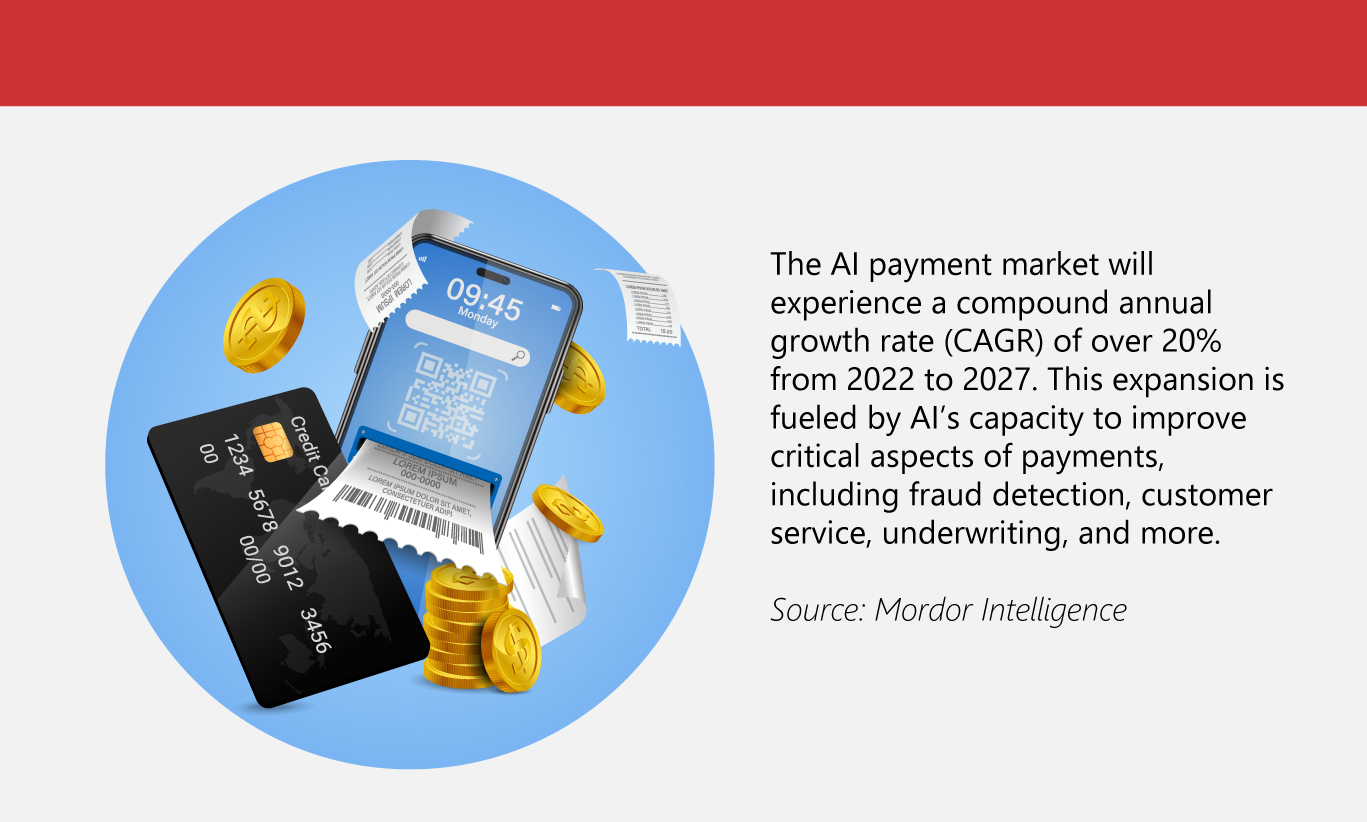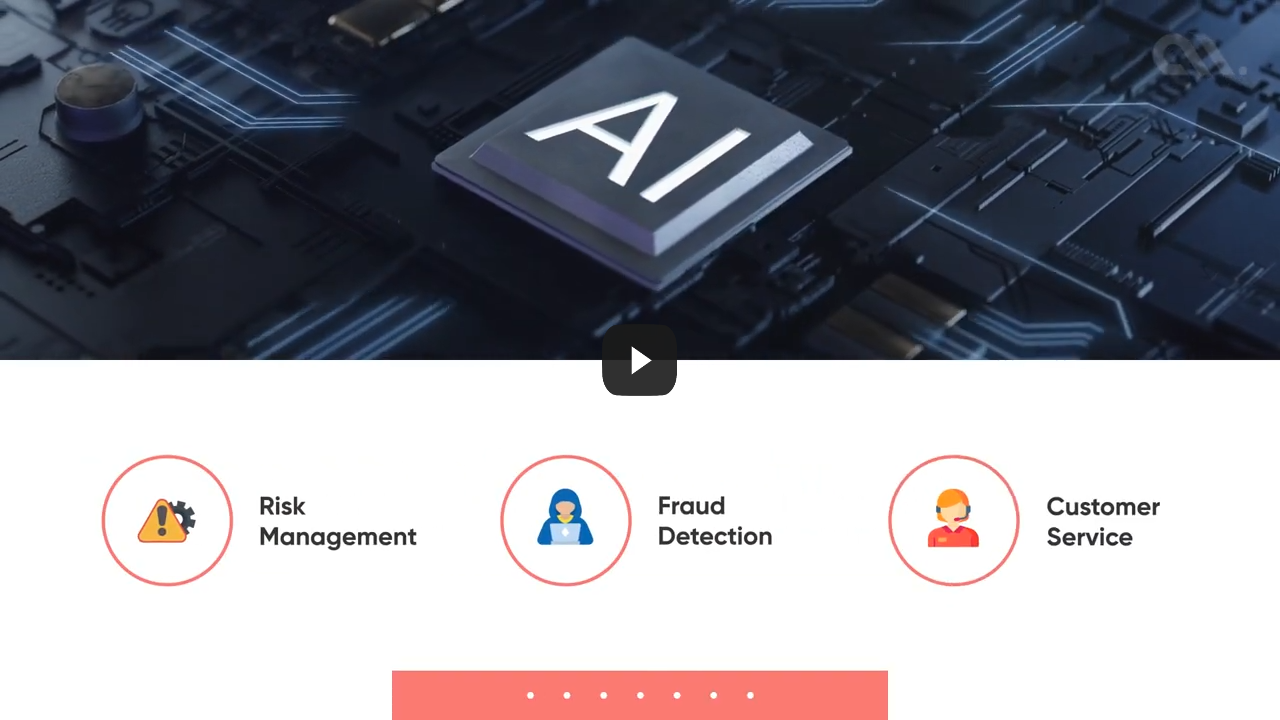7 Ways Payments Can Benefit from AI

Future-ready companies should prepare for a cardless era. According to global credit card leader Visa, consumers can soon manage all their payment methods, including bank accounts, credit cards, and debit cards, in one platform. Such a move can potentially outdate physical cards.
Artificial Intelligence (AI) creates a wave of change across various processes—global manufacturing, supply chain management, design, and engineering. You name it, AI is likely involved in upgrading it. Today, this technology is transforming the payment landscape, making it more secure and intuitive.
Recently, Visa announced new product introductions that aim to upgrade managing transactions across accounts. In the next ten years, the corporation made a bold prediction: consumers could use a single credential to access all their cards. This will allow them to select their preferred payment option, including credit and debit cards, direct transfers from their bank account, and installment payment options.
Visa is also broadening its contactless payment options—a preference steadily strengthening over the years. According to the company, Tap to Pay, instead of swiping the credit card, has achieved a global adoption rate of 65%. This means that consumers are open to more streamlined and convenient payment methods that are potentially cardless.
But with physical card numbers becoming less significant, the threat of cyberattacks grows, especially with weak digital measures. Digitally stored card numbers increase the risk of data breaches and fraud if security systems are compromised.
How AI can boost digital payments
Such issues are the reasons why Visa and other companies are leveraging AI. With two-thirds of adults globally utilizing digital payments, the difficulties related to cybersecurity, user interface, and operational efficiency also arise. Moreover, the clamor for immediate, smooth, and safe transactions is stronger than ever.
By harnessing AI’s capabilities, companies hope to maximize these benefits:
-
Fraud prevention
Fraud prevention is crucial for payment providers. AI enhances detection by analyzing extensive volumes of transaction data and identifying suspicious patterns. Machine learning algorithms process data points like device IDs, location, and transaction history in real time to flag potential fraud, allowing quick action before financial loss occurs.
-
Faster and more efficient processes
In a fast-paced world, AI is crucial for swift and efficient payment solutions by accelerating transactions and enhancing customer satisfaction through automation. It reduces operational bottlenecks by automating repetitive tasks, minimizing errors, and streamlining processing. AI technologies like natural language processing (NLP) and optical character recognition (OCR) allow touchless invoicing, while predictive analytics optimize cash flow and settlement times.
-
Savings boost
Using AI in payments offers significant cost savings for companies and financial organizations by reducing fraud-related expenses and cutting operational costs. AI minimizes fraud instances, saves money on related losses, and automates routine tasks, leading to lower operational expenses and improved financial performance.
-
Faster risk appraisals
Real-time risk evaluation is essential in lending, and AI enhances this by analyzing various data sources to assess lending risks. This leads to improved decision-making and fewer errors. By providing faster and more precise risk assessments, AI helps financial institutions make wiser and more effective loan decisions.
-
Enhanced customer service
Chatbots and virtual assistants using NLP can handle common queries—like account balances and transaction issues—24/7, reducing call center volumes and improving support. AI-driven chat functions also boost efficiency and manage costs. This is especially appealing to Gen Z consumers, who value seamless digital experiences, making it crucial for retailers to offer faster checkouts to engage and retain customers.
-
Tailored customer experience
Payment companies gain a better understanding of customer preferences because of AI. By analyzing past purchases and online activity, AI tailors payment products and services to individual needs. It also automates transaction categorization, improving budget management and forecasting. Personalized interactions via AI chatbots enhance customer experiences, meeting rising expectations for customized shopping and payment solutions.
-
Plans driven by data analytics
By utilizing AI, payment firms can analyze large volumes of transaction data to gain timely insights. This approach reveals emerging revenue streams, market trends, spending behaviors, and areas for improvement.
Challenges of implementing AI in payments
However, AI-infused payment systems also pose these difficulties:
-
Boosted data protection
In this age of online payments, data privacy is essential. Applying AI in transactions demands collecting and studying copious amounts of data, which can bring up privacy issues among buyers and regulatory organizations. This is why complying with rules on global data security is crucial in safeguarding consumer confidence and evading penalties.
-
Substantial implementation costs
AI integration may require huge upfront costs, which is especially challenging for SMEs with limited means. Significant expenses include specialized hardware, software, and cloud services. Additionally, collecting and managing large datasets for AI training can be resource-intensive, demanding more spending on data acquisition, storage, and management systems.
-
Human supervision
AI may boost automation and operational efficiency, but human intervention may still be necessary to guarantee precision, the implementation of ethical measures, and effective troubleshooting in emergencies. It’s vital to discover the proper balance between automation and human intelligence in an environment powered by AI. Training and educating the workforce on AI technologies is also important to create a harmonious and cost-efficient workflow.
-
Quick evolution of payment models
Financial companies need to stay agile as payment models continue to evolve. This agility is crucial for integrating new technologies, meeting changing consumer preferences, and complying with regulatory updates. Staying adaptable helps these companies innovate, maintain a competitive advantage, and ensure customer satisfaction in a dynamic financial landscape.
-
Ethical concerns
AI may include possible biases, resulting in skewed decision-making. Some experts are also concerned about the lack of transparency in AI processes. To ensure AI’s ethical application, payment firms must uphold best practices while fostering stakeholder collaboration and adhering to standards and regulations. Following these strategies can help companies espouse ethical procedures while dealing with the nuances of AI-driven payments.
 As one of the Top 20 EMS companies in the world, IMI has over 40 years of experience in providing electronics manufacturing and technology solutions.
As one of the Top 20 EMS companies in the world, IMI has over 40 years of experience in providing electronics manufacturing and technology solutions.
We are ready to support your business on a global scale.
Our proven technical expertise, worldwide reach, and vast experience in high-growth and emerging markets make us the ideal global manufacturing solutions partner.
Let's work together to build our future today.
Other Blog



